Gun Violence
Two studies of government data show US Gun crime has decreased from its peak in the middle of 1990s. However more than 50% of American think gun crime has risen. The media coverage of recent mass shooting may contribute to the misconception. The Los Angeles Times reports:
The number of gun killings dropped 39% between 1993 and 2011, the Bureau of Justice Statistics reported in a separate report released Tuesday. Gun crimes that weren’t fatal fell by 69%.
Read more here.
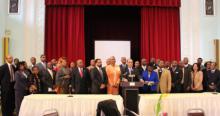
WASHINGTON — Black clergy have launched a new coalition to fight gun violence, saying they are undeterred by the recent failure of legislation on Capitol Hill and all too aware of the problem of gun violence.
At meetings held Tuesday in Washington and Los Angeles, supporters of the African-American Church Gun Control Coalition called gun violence “both a sin and a public health crisis” and committed to a three-year action plan of advocacy, education and legislative responses.
“As people of God and as faithful members we have the obligation to stir the world’s conscience and to call on our nation’s decision makers to do what is just and right,” said the Rev. Carroll Baltimore, president of the Progressive National Baptist Convention, which convened the coalition.

When a distressed child hugs a teddy bear, there is a moment of innocent comfort that not only soothes the child but the grownups around her, too.
No wonder, then, in the wake of the Dec. 14, 2012, mass shooting in Newtown, Conn., the donation of choice for many people was a teddy bear. The bears — huge, tiny, handmade, store-bought, rainbow-colored, traditional brown — began arriving within 24 hours of the tragedy. They came from churches, children's groups, Facebook campaigns, car dealerships, and individuals across the globe.
Undeniably, for some of the children in Newtown — and adults, for that matter — a new stuffed animal was just the right gift at the right time.

When the really hard stuff happens, when we witness the true face of evil, Americans have a predictable habit. Even as cameras feed the latest bubble-shattering violence into our family rooms, we start looking for someone or something — anything — other than the actual perpetrators to stone. We panic for a scapegoat.
We hunt tirelessly for the person (a parent, an educator, a cop) who didn't catch the warning signs, who failed to read a memo — anyone on whose shoulders we can cast our collective fear — then rush as many measures into place as possible, no matter the cost in treasure or freedoms, to regain an illusion of safety and impenetrability.
One iteration of that really hard stuff happened at Sandy Hook. The backstory is eerily familiar. A young man, left to stew in our culture's juices, fleshes out the nightmare in his broken soul, and deals out tragedy in living color as if the holy innocents of Newtown were mere pixels on a screen, points in a twisted "shooter." Now, just four months later, it's a swept-away moment of terror and sadness that everyone just wants to forget because it's unthinkable to think on it any longer.
Virginia Tech, Aurora, and Newtown each stopped the nation in its tracks but we eventually moved on, and before anyone might guess, well over 3,000 more have died by gun violence in America since December.
The U.S. Senate has just failed to get 60 votes on a bipartisan proposal to expand gun sale background checks. Politico reports:
“The vote was 54-46, with only four Republicans crossing the aisle and voting with the Democrats in favor of the bipartisan proposal by Sens. Joe Manchin (D-W.Va.) and Pat Toomey (R-Pa.). Sixty votes were needed.”
Four months after the Newtown massacre, a compromise measure that would have banned no guns, no magazines, is apparently still too strong. And what is especially outrageous is the continued abuse of the filibuster, requiring 60 votes for anything to pass the Senate. Is there any other legislative body in the world where a proposal can pass by 8 votes and lose?
Guns are dangerous idols. While mass shootings are happening at an alarming rate and an epidemic of gun violence plagues our nation’s cities, our society’s fanatical devotion to weapons prevents us from enacting solutions to curb the violence. The cost of worshipping these false idols continues to rise, as firearms kill more than 80 people a day.
Since the Dec. 14 shooting in Newton, Conn., nearly 3,500 people have died because of a gun. Some of them were suicides. Some were gang-related gun deaths. Many use these facts to insinuate that the deaths somehow aren't equally tragic. But as Christians we know that all of them were children of God created in the Divine image.
While the idolatry rages on, prophets are beginning to speak out.

The common good is not only about politics. The common good is about life and how we live it. It is ultimately about how we are all connected. It is about how our love or lack of love affects our families, our neighbors, our communities, our cities, our nation, and our world.
The common good is about personal brokenness. Have we taken the time to let Jesus come in and heal the wounds that distort the image of God within of us — wounds that drive daughters and sons, mothers and fathers to self-destruction? Have we taken the time to let the Great Physician heal the personal wounds that break families and friendships, slicing the central fabric of society? We are all connected.

Last week, the Senate began a floor debate on gun control that brought to mind an earlier “floor debate” several months ago in Chaska, Minn.
Ever since our Community Dialogue on “Gun Violence in America,” I’ve searched for answers to what happened.
A crowd of 138 people came out on a Tuesday night to chime in following the tragedy at Sandy Hook in Newtown, Conn.
As the night wore on, it became clear that there would be no real dialogue, no moderated discussion. No give-and-take. A series of monologues, without interruption and with a time limit, was the best we could expect.
Fear, anger, hostility, and suspicion were in the room. The room was hot.
The months following have been a personal search for understanding of what happened that night, and how we in America move forward together on such a divisive issue.
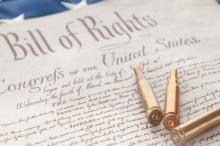
Meaning happens when the purposes of the writer come together with what the reader thinks is important. Since all aspects of any one thing cannot be perceived all at once, we focus our attention on this or that aspect of a thing depending upon what we want to achieve. This is why we can read a particular text many times and find new insights each time. This is also why we cannot agree on what the Second Amendment of the U.S. Constitution means.
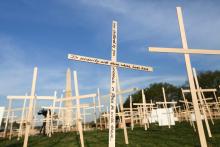
Today, on the National Mall, I stood with fellow faith leaders, including clergy from Newtown, to remember lives lost at Sandy Hook elementary school and the 3,364 gun deaths that have happened since.
We stood in front of a field of crosses, Stars of David, and other grave markers, and it broke my heart to think that each one stood for a life ended too soon. It doesn’t have to be this way. Commonsense steps to reduce gun violence are within our reach. Just today the Senate voted to begin the debate. But there is much work to do. Lawmakers need to hear from you.
This is one of the clearest examples of a stark democratic choice: the old politics of guns or the morality of the common good. The clergy are here today for the common good.

As the Senate takes up a heated debate over gun control and background checks, Catholic bishops have used the months since the Newtown school massacre to push gun control in email blasts and Senate Judiciary Committee testimony. But among the Catholic faithful, not everyone supports gun control measures.
Call them the NRA Catholics.
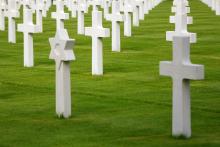
For many pastors of urban congregations, “stepping up” to end gun violence stems from a very personal place — as they have been forced to bury their own neighbors and church members. According to Samuel Rodriguez, gun violence – especially in urban areas – deeply affects interfaith leaders there, who are declaring violence-free zones and taking action.
Faith-based leaders in Philadelphia and Chicago have rallied to fight gun violence. Heeding God’s Call, based in Philadelphia, holds prayer vigils at the locations of gun homicides as well as organizes gun-store campaigns that ask gun store owners to sign a code of conduct.
In Chicago, All Saints Episcopal Church organized CROSSwalk, a walk through downtown Chicago, which drew a few thousand people the past two years. Violence on Chicago streets has killed more than 800 young people in the last six years.
Nuenke addressed breaking the chain of violence and pain that we see in every community. He quoted 2 Corinthians 1:3-4 and Isaiah 61 as examples of God’s compassion and its life-changing, healing power.
“What would happen if the body of Christ more fully was involved in living out Christ’s compassion in a broken world?” Nuenke asked. “Sometimes people who are hurt or experience violence end up hurting other people. The care and compassion they might receive from the Lord Jesus will impact them more in 20-30 years than anything else.”

The conversation yelling match around gun control is exhausting — both in terms of the ethical boundaries each side will breach to advance its cause, and the way our rhetoric has turned into an exercise in “crash-testing:” we always hit a wall in talking our good sense to the Dissenters, but are content to back up, add force, and try again. Because “One day, THEY will see the light. One day, THEY will become US”…
… crash!
The more gun violence we experience as a nation correlates to our panic in pursuit of the common good, however we define it. And get too many panicky people in a room – people who are certain they are right – and watch how skillfully they evade progress. I am a pastor in Chicago and I speak on behalf of all who serve in neighborhoods where violence has become the rule and not the exception: I am tired of you hitting the wall.
This course of action and righteous disrespect of Those-With-Their-Heads-You-Know-Where will not make us masters or better neighbors. It has made us dummies. And while we are arguing, our children are losing. In Chicago, and Baltimore, and Detroit, and Newtown, and in Washington. They are losing because we are competing to see who can make the wall topple over the other first. Because we are arguing over rights from the wrong perspective.
Driven by our moral call to protect each member of our society, people of faith have been outspoken about the need to craft meaningful legislation to reduce gun violence. This week, Mayors Against Illegal Guns released an ad featuring a diverse group of religious leaders, including Sojourners CEO and President Jim Wallis, leaders to demand that Congress make common-sense reforms to our nation’s legislation that is failing to keep us safe.
The faith community continues to speak loudly and clearly about the moral urgency to address this issue. The only question is whether Congress will listen and finally address the epidemic of violence that plagues our nation.

My city of Chicago, known as the City with Big Shoulders, is now on its knees. But it’s not prostrate in some humble submission to God. No. Instead Chicago is weeping from the emotional exhaustion of having to bury too many youth who have been murdered.
Last year Chicago recorded 2,400 shootings and more than 505 murders, of which more than 108 were teenagers of color from seven violent communities. Already 2013, with less than two months into its birth, has seen 49 murders. Those of us on the ground seeking to bring change to this pandemic of violence know that if the Chicago cold winters are this violent, then the hot summers will not cool off. On top of the hard and constant news about those who are killing and being killed, Chicago Police stats show that only 34 percent of the murders get solved within one year. If the detectives have two years on a case, then the rate barely reaches 50 percent. The national average of murders solved is 64 percent. New York’s rate is only 60 percent. In Chicago, though, one has a 50-50 chance of getting away with a murder.

In the 1980s television show, “Fantasy Island,” the island watchman heralded the arrival of individuals attempting to escape their reality with a call of “the plane … the plane … the plane!”
In the weeks since the Sandy Hook tragedy, I’ve spent much of my time in Washington, D.C., preaching about our moral mandate to reduce gun violence, especially in our urban neighborhoods. However, in my time in the capital, I have come to feel as though there are many arriving in Washington on the proverbial plane, escaping the realities of their hometowns, for the Fantasy Island in the beltway.
In the Book of Proverbs, we read, “Buy the truth — don't sell it for love or money; buy wisdom, buy education, buy insight (Proverbs 23:23, The Message).”
Sadly in Washington, truth seems to be for sale; wisdom seems to be radically individualized; education seems to be mocked; and insight seems to be unable to breach the partisan walls in our nation’s capital.
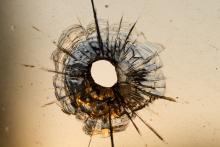
Death doesn’t make sense — especially when it interrupts the life of one so young. Richard Twiss was only 58 years old.
It makes me think: Richard was one life, cut short by a heart attack. What about all the images of God erased from our lives and families every year through gun violence in the U.S.? What about their families and pastors and youth groups who held vigils in waiting rooms across the country? What about the estimated 1,793 gun deaths since the Newtown massacre? How valuable are their lives?

Edmund Burke once said, "all that is necessary for the triumph of evil is that good men do nothing." So what is at the heart of the endless stream of violence in our country — is it guns or is it something a lot harder to eradicate — passivity?
The overwhelming response would likely be "it's the guns, stupid." But in this fight, the individual with the loaded AK-47 rifle may be only slightly less dangerous than the passive citizen, the average person who may think "something should be done about guns,” but fails to stand up and make their voice heard.
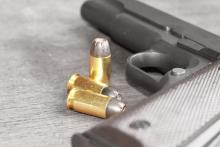
A well-known restorative justice film, "A Justice That Heals" recounts the role of faith and the church in caring for the families of both a murderer and his victim. The film climaxes in the mother’s act of forgiveness and counsel to the young man who killed her son. The power of that image of repentance, reconciliation, and restoration almost obscures another dimension of the grieving family's response to the death of their son. The victim's father resigns his job and becomes the director of an advocacy group for gun control.
The late Carl Dudley demonstrated in his research on mobilizing congregations that communities of faith rally to advocacy only after they have generated sufficient energy about and engagement with those affected by the policy. Congregations care about people not policy, stories over statistics, and narratives before numbers. Even the civil rights movement found its genesis in the story of Rosa Parks, and others like her, rather than in the "ethics" of segregation and discrimination. So, like the family in "A Justice That Heals," our work to mobilize around gun control requires creating a climate where people's experience with those who are victimized by bad policy.
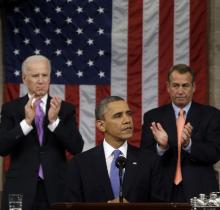
There is a tradition in the black church named “call and response.” It’s simply the experience of the preacher “calling” and the congregation “responding.” I’ve always loved it. When you’re preaching in a black church, and the congregants begin to actively and vocally respond, your sermon can actually get better, stronger, deeper, and more powerful than it might have been if everyone just sat there. Sermons get interactive. Congregations can be inspired by the preacher — and the other way around. Ideas grow, get taken further, and even develop during and after the sermon. And it can make things change.
After his first year in office, I sent a letter to President Barack Obama humbly suggesting he needed “the political equivalent of the black church’s call and response.” Just talking to and in Washington was never going to get important things done. Washington just sits there and mostly makes sure that things don’t change — and that the special interests that buy, shape, and control this city usually have their way. (That private letter to the president will be published for the first time in my new book about the common good coming out in April.)
I recalled something Obama said right after the 2008 election — that he would need “the wind of a movement at my back” to get anything really important done. He would have to go over the heads of Washington, to speak directly to the people that had elected him and also those who didn’t. He would have to have public debates about the common good and not just debate in Washington.
I saw him do that in this week’s State of the Union speech.